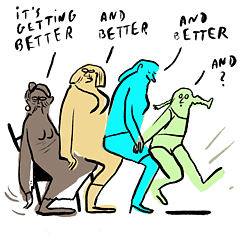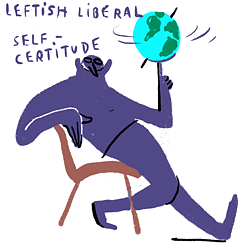24.02.2020 | Jonas Lüscher
One year Zeitgeister - what`s changed?
Dear Friends,
About a year ago we started a conversation about various manifestations of populism, and I should have opened the second round with a new contribution some time ago. But for months now I’ve been finding it hard to write, whether fiction or essays, and even to speak. And once you lose your capacity to write and speak – as you, dear friends, will certainly understand only too well – you risk losing your capacity to think, too. What’s left is an interior monologue, constantly revolving around itself, that finds no expression in outwardly directed speech acts and no clear-cut articulation in writing; it soon ceases to bear any relation to thought and increasingly comes to resemble the processes of rotting, of decay and decline, that we know from closed organic systems.
Naturally, my state of mind has a lot to do with the current political and ecological situation, as well as with our conversation here. I aim to confront this crisis here – a crisis which, it seems to me, isn’t merely personal, since many who feel they’re in a similar state (to be specified in the following) are grappling with similar thoughts – by trying to articulate what has brought me to the brink of mutism.
Nobody who knows me personally or has read my books and essays has ever accused me of excessive optimism. Indeed, a certain pessimism has accompanied me my whole life long, but I always managed to keep up a modicum of optimism, without which I could hardly have written books or taken part in political debates. Why would I do any of that if I didn’t have some conviction somewhere – sometimes buried deep down inside, but still there nonetheless – that things are changing, albeit unbearably slowly, for the better, and that I can make a contribution, however small that might be, by speaking out?
But I’m having an increasingly hard time mustering what little is left of my optimism. That has to do with our subject-matter and our conversation about it, though in different ways. The most obvious place to start would be where Maria left off last July with her quite cautiously expressed optimism that something was happening in her country. She wrote about the Moscow protests, which were different from those in 2012 because this time around a broader swathe of the electorate were demonstrating and especially because, as Maria wrote, many young people were taking to the streets with a courage that seemed new to her. Even from far away, however, I have reason to believe Maria's faint hopes have been disappointed. I haven’t heard of any more protests in Russia. And the constitutional reform masterminded by Putin seems – at least that’s the way it looks to us here in Germany – to be going through more or less uncontested. So once again, Maria, your hopes that the country no longer wants to live in a made-up past, but in a present in which young, progressive, socially liberal forces have a say, have been dashed and deferred to a made-up future (but I’d be glad if you were to prove me wrong here).
Last year was marked by uprisings everywhere against the old repressive forces of populism. But we aren’t hearing much of the same anymore.
Generally speaking, last year was marked by uprisings everywhere against the old repressive forces of populism. But we aren’t hearing much of the same anymore. Even the protests in Iran around New Year’s seem to have fizzled out, at least as far as may be gathered from the Western press. Over in the States, the president, who had obviously violated the constitution, was acquitted almost unanimously by his party's senators, who clearly had no interest in discharging their constitutional duty to serve as objective and non-partisan jurors. This unspeakable – though totally predictable – scandal should have triggered mass protests by the citizens of a democracy. But this hope was dashed too.
I could easily fill page after page with such depressing news from around the world these days. I haven’t said a word yet about the tragic situation in war-torn Syria, Yemen or Libya, for example, not to mention the recent crisis in stable Germany, where a new state government head in Thuringia – one of the new states in Eastern Germany – was elected with votes from the xenophobic Alternative for Germany (AfD). (NB. The Thuringian AfD represents the extremist wing of this already far-right party. Regional spokesman Björn Höcke, an anti-Semitic and Islamophobic revisionist, can be called a fascist with the judge’s blessing now that he lost his injunction suit). The Thuringian conservatives (Christian Democrats, CDU) and free-market liberals apparently considered it the lesser evil to enlist AfD support than to accept a left-wing Ministerpräsident (governor). The general public and politicians at the federal level recognized this move as, at the very least, breaking a taboo, given the cross-party consensus that no one should join forces with the AfD. This consensus grew out of a historical consciousness, for it is now undisputed that pacts of this kind by conservative forces in the late 1920s and early 1930s were precisely what enabled the Nazis to seize power.
Although the newly elected Thuringian Minister-President has already resigned under pressure from his own national party, the incident burst a dam in German politics, plunging the chancellor's party (CDU), in particular, into a grave crisis that’s likely to haunt Thuringia for some time to come and already augurs turbulent and very fragile times to come in the post-Merkel era.
We were convinced, in our heart of hearts, that things were getting better. (...) Freedom and solidarity were gradually spreading, humiliations and cruelty abating.
As you can see, my pessimism feeds on everything from international geopolitics to the details of regional politics in German Länder. But I want to try to put the causes of my unease in somewhat more general terms. It seems to me that several generations in the West, starting with the post-war generation of my parents, have lived in a state of left-liberal certitude. We were convinced, in our heart of hearts, that things were getting better. That despite the ongoing and often arduous struggle against reactionary forces, we were basically on the winning side. That social injustice was slowly but surely on the wane, whilst gender equality was gaining ground, gay rights increasingly self-evident, society more egalitarian, open, secular and diverse, heroics increasingly ridiculous and incomprehensible, the welfare state expanding, sexual morals less rigid, nations more friendly and peaceful towards each other – at least in Europe... In short: that freedom and solidarity were gradually spreading, humiliations and cruelty abating.
 © graphicrecording.cool
Not that we felt everything was hunky-dory. No, there was still much to be done, especially on a global scale. We suffered minor setbacks occasionally and it was an ongoing uphill battle, but we were actually making headway, changing things by and large for what we thought was the better. We were so sure of that – as I freely admit, though you may call me naïve – that I, for one, maintained there would almost certainly be no more war in Europe in my lifetime. Although cracks in these certainties had been forming for quite some time, they were hardly noticeable and therefore easily glossed over. But this liberal self-assessment is now shattered. And I think I can pinpoint, at least for myself, that certitude was struck a blow that could no longer be ignored: when Russia annexed Crimea in early 2014. For others, it might have been Brexit or the election of Trump or perhaps some calamity unnoticed from my German perspective. For me it was the annexation of Crimea. All of a sudden, the possibility of a major war breaking out on the European continent could no longer be dismissed out of hand. But what seems even more crucial to me is that that moment marked the return of the ruthless old geopolitics of “might makes right”, just as we’d been hoping it would be overcome by Obama’s presidency – which may sound quite naïve in hindsight, but that's how it felt back then. And it turned out all too plainly that there was nothing the liberal West could do about this blatant outrage. Here it was again: that horrible old bull-necked chauvinism. That barrel-chested brutality. That smirking anti-intellectual machismo. Those dumb heroics.
© graphicrecording.cool
Not that we felt everything was hunky-dory. No, there was still much to be done, especially on a global scale. We suffered minor setbacks occasionally and it was an ongoing uphill battle, but we were actually making headway, changing things by and large for what we thought was the better. We were so sure of that – as I freely admit, though you may call me naïve – that I, for one, maintained there would almost certainly be no more war in Europe in my lifetime. Although cracks in these certainties had been forming for quite some time, they were hardly noticeable and therefore easily glossed over. But this liberal self-assessment is now shattered. And I think I can pinpoint, at least for myself, that certitude was struck a blow that could no longer be ignored: when Russia annexed Crimea in early 2014. For others, it might have been Brexit or the election of Trump or perhaps some calamity unnoticed from my German perspective. For me it was the annexation of Crimea. All of a sudden, the possibility of a major war breaking out on the European continent could no longer be dismissed out of hand. But what seems even more crucial to me is that that moment marked the return of the ruthless old geopolitics of “might makes right”, just as we’d been hoping it would be overcome by Obama’s presidency – which may sound quite naïve in hindsight, but that's how it felt back then. And it turned out all too plainly that there was nothing the liberal West could do about this blatant outrage. Here it was again: that horrible old bull-necked chauvinism. That barrel-chested brutality. That smirking anti-intellectual machismo. Those dumb heroics.Naturally, this crude machismo had never completely disappeared. But for a while there, it had a slightly less menacing visage: e.g. Berlusconi's powdered made-up face with his painted hairline, the crocodile smile baring his gleaming white false teeth, and his “bunga bunga” sex parties. There was something laughable about all that because he was so obviously a dinosaur, a species on the way out, but still pounding with its last ounce of strength on its dyed chest hair. I am exasperated and deeply unsettled by the blatant return of the sort of crude bull-necked machismo epitomized by Putin and, in his wake, Erdogan and Bolsonaro as well as Trump in his own TV-show-like way.
This ties into the second reason to keep silent. (You might well be thinking right now that, for someone who talks about mutism, I certainly am verbose! In fact, what I’m doing here is a contortion worthy of Hugo von Hofmannsthal, who had his Lord Chandos write a most eloquent letter about how words were failing him. However, I do hope I’ll manage to resolve this contradiction somewhat by the end of this letter to you.)
So, the second reason has to do with Yvonne's letter of last May, which began with a confession that she was writing from what she called a “Schadenfreudian” position. She went on to explain:
Yvonne’s comment has haunted me over the past few months. I’ve come across variations on it again and again in the writings of other authors and in private conversations. It has hugely exacerbated my unease. I had to ask myself: Isn’t my perspective – that of a Central European white man with no material worries, born into a family of academics and educated in the humanities, i.e. whose thinking is deeply rooted in the European humanistic tradition, inalterably influenced by the thinkers of antiquity and the Enlightenment, liberalism and social democracy – isn’t my point of view more part of the problem than part of the solution? Isn’t my opinion simply unwanted right now? I must stress that I don’t mean this in any insulted or narcissistically slighted way. I had a gnawing suspicion that, being caught up in my intellectual way of seeing things and my community of like-minded peers, I might no longer be capable of analysing the issues we’re addressing here in a meaningful way, let alone coming up with solutions to our present predicament that leave the beaten track.
 © graphicrecording.cool
Which automatically leads to the next question: Shouldn’t i just shut up so as not to fuel – albeit inadvertently and with good intentions – the discourse we’re actually trying to combat, or at least so as to make room for opinions from different perspectives that are far too seldom heard?
© graphicrecording.cool
Which automatically leads to the next question: Shouldn’t i just shut up so as not to fuel – albeit inadvertently and with good intentions – the discourse we’re actually trying to combat, or at least so as to make room for opinions from different perspectives that are far too seldom heard?As you can see from this letter, however, after grappling with these questions for a long time, I eventually changed my mind. This decision was largely thanks to a few lines from Die kalte Schulter (Cold Shoulder), a 1989 novel by the Swiss writer Markus Werner which I recently reread after many years. The novel’s protagonist, a painter named Moritz Wank suffering from a creative and existential crisis, travels cross-country to a place near his native village. In a field he sees the tree from which a college friend hanged himself many years ago – suicide is, especially as a literary topos, the most consistent form of keeping silent. Wank strikes up an imaginary conversation with his dead friend. He imagines his friend asking him what he has missed all these years. Wank replies that “there hasn’t been much happy news to report since his suicide, the bull-necked men have rapidly proliferated and wreaked more and more havoc." And then Wank says, "Everything that troubled you is still with us, and yet you should have stuck around, yes, you missed a lot, we miss you, and every suicide makes the buffaloes’ side stronger."
Those who keep silent are bolstering the ranks of the coarse and the cruel. We must use our voices to keep a certain way of speaking alive.
I read this last sentence as: everyone who remains silent makes the buffaloes’ side stronger. So it struck me, in my situation, as a call to speak out. (I should explain that the German words for bull (Stier) and buffalo (Büffel) – as well as for bullheadedness (Stiernackigkeit) – suggest coarseness, brutality, machismo, i.e. the Bolsonaros, Trumps, Erdogans, Orbans, Höckes and Putins of the world.) Those who keep silent are bolstering the ranks of the coarse and the cruel. We must use our voices to keep a certain way of speaking alive. To insist on the value of fact-based arguments and speak out against the misuse of language to humiliate others and to justify brutality.
I cannot claim that this regained conviction has dissipated the above-described unease or answered the many questions I ask myself. No, I think I need to rethink a great many liberal self-certitudes that have been shaken up. Nor, of course, does this conviction resolve the question of perspective, of a representative view, of being stuck in the filter bubble of a community of discourse. Rethinking won’t be enough to solve that problem, but listening might help.
In my present state of mind, there is only one thing I can say with certainty: cruelty must be prevented. And now, as I come to the end of these remarks, I have at least scraped together enough left-over optimism to believe that we can indeed make a small contribution by speaking out, even if it’s only a matter of not giving way to the buffaloes.
It is encouraging to see that Carol comes to a similar conclusion in her last letter. And I venture to believe that Ágnes would have agreed with me too.
Yours cordially and with faintly enduring optimism,
Jonas
